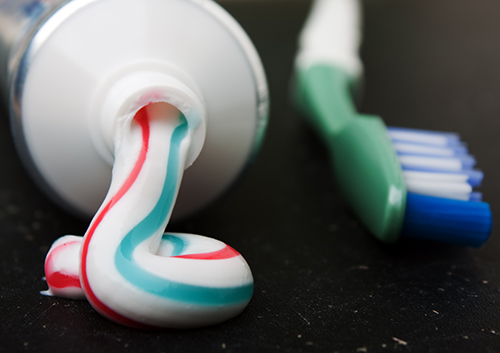May 9th, 2019

Drs. Emily Ruthven and Daniel Cepeda and our team recommend that you brush your teeth two to three times a day, for at least two minutes each time. But have you ever wondered what’s in toothpaste and how it actually works? The mouth is home to more than 500 types of microorganisms that feed on leftover food that gets stuck on and around your teeth. Toothpaste is the best line of defense against all those pesky microorganisms (especially when you brush two to three times a day). Here’s how it works.
Abrasives
Toothpaste contains mild abrasive additives that combat microorganisms and fight plaque. When you brush, the abrasives in toothpaste dislodge food particles and microorganisms more effectively than if you simply brush your teeth with water. The abrasives also work to remove food stains and polish the surface of the tooth. Some toothpastes include ingredients like triclosan and Xylitol. These chemicals prevent the growth of bacteria that produce plaque. Plaque not only causes cavities, but it can also lead to more dangerous issues like periodontal disease.
Fluoride
Fluoride is key ingredient in toothpaste. As the microorganisms in your mouth feed off the leftover food particles, they leave behind acid and sulfur byproducts that wear away the enamel of the teeth. This is the fancy, technical way of saying that the acid on your teeth causes cavities. As for the sulfur byproduct –well, that’s just a fancy, scientific name for bad breath. Fluoride works to fight the acid and help protect the teeth. By brushing, the fluoride is incorporated into the tooth enamel, which in turn makes the tooth more resistant to acid and plaque.
Flavoring and Sweetening Agents
Not all toothpaste tastes the same, right? The type of flavoring or sweetening agents added to the toothpaste doesn't have anything to do with fighting microorganisms and plaque, but taste is one of the most important selling points in finding a toothpaste brand you like. Flavoring agents mask the taste of some of the other ingredients in toothpaste, and without those agents chances are nobody would be brushing their teeth two to three time a day.
May 2nd, 2019

Summer is almost here, which means a season full of vacations, adventures and great memories is just around the corner for our patients at North Appleton Dentistry.
Everyone wants a glowing and radiant white smile when the sun comes around and we have a few reminders to keep your pearly whites healthy and beautiful over the summer! Try to stay away from drinks that will stain your teeth like coffee, soft drinks, or dark colored juices. Not only will drinks like this weaken your enamel but they will also darken that fabulous smile you're working on! Another tip is to try and focus on brushing your teeth; everyone knows that when busy schedules start picking up, getting a good brushing session in tends to take the backseat! A good tip for keeping your mouth safe from staining and other possible pitfalls is to rinse your mouth with water after any meal you can’t fully brush your teeth after. Your teeth, inside and out, will benefit!
And remember, whether you are headed to a barbecue, a camping trip, or just having fun in the backyard this summer, we want to hear all about it! Make sure to let us know what you’re up to below or on our Facebook page! We also encourage you to post any photos from your adventures!
April 25th, 2019

A lot of changes occur in a woman's body during pregnancy. Hormone fluctuations are responsible for many of those changes, including the need for additional attention to the teeth and gums. Women who are expecting are at an increased risk for oral health complications, including gingivitis and tooth decay, which can lead to irreversible damage. Fortunately, there are steps pregnant women can take to keep their teeth and gums in optimal health from the first trimester to delivery day. Today, Drs. Emily Ruthven and Daniel Cepeda and our team at North Appleton Dentistry thought we would share them.
At-home dental care
At-home dental care should not vary much from what you did prior to pregnancy. The American Dental Association recommends brushing at a minimum of twice per day using fluoridated toothpaste. Follow up with floss to keep bacteria from accumulating in hard-to-reach spaces.
Dental checkups
It is safe and recommended to continue visiting Drs. Emily Ruthven and Daniel Cepeda for routine dental checkups and cleanings during pregnancy. However, it is very important to inform Drs. Emily Ruthven and Daniel Cepeda about an existing pregnancy. Special steps must be taken to protect pregnant women from certain medications or X-ray radiation that could be harmful to a growing baby. On the other hand, avoiding teeth cleanings during pregnancy can lead to serious consequences, including advanced tooth decay and infection.
Food and cravings
It is no secret that pregnancy can cause a woman to crave specific foods. Sugary treats like candy, cookies, or sodas may satisfy a sweet tooth, but they can also cause serious dental problems when consumed frequently or without brushing afterward. Trade out these treats for naturally sweet fruits when possible, and never forget to brush and floss thoroughly after eating sugar-filled foods.
Signs of complications
It is important to know and recognize the signs of oral health problems during pregnancy; an early diagnosis usually translates to an easier, less-invasive treatment. Symptoms of potential problems include gums that easily bleed or are swollen, reddened, or painful. These are symptoms of gingivitis, which can lead to a receding gum line and tooth loss if left untreated.
Call our North Appleton office if you experience any of these symptoms or pain in a tooth, loss of a tooth, a broken tooth, or bad breath that does not go away with brushing.
April 18th, 2019

During the early days of the environmental awareness movement, those who demonstrated against pollution, toxic chemicals, and the general public health were known as hippies. The early 1970s were a time of change, and assertions that we needed to pay more attention to the Earth's atmosphere were generally dismissed. But within a couple decades, it had become clear that the previous generation was right; the citizens of the world needed to become more environmentally conscious.
Many people feel that they can't make a difference if they don't do something big. But caring for the environment doesn't have to be an all-or-nothing concept. In fact, the little things you do can add up to make a great impact, especially in our community. Here are a few ways you can help the environment on Earth Day, April 22nd and all year around.
Four Small Ways to be Environmentally Friendly
- Recycle Your Textiles. Nearly 21 million tons of textiles are added to American landfills each year, according to the Environmental Protection Agency. Donating your unwanted clothing to a secondhand store or an organization that repurposes fabric helps cut down on solid waste and conserves natural resources.
- Reduce Usage of Disposables. Plastic bottles and bags, disposable diapers and other things we can use and toss out are convenient, but they're not necessary. Simply choosing to replace one of type of disposable with a reusable product can help you cut down on waste that has a large negative impact on our environment.
- Conserve Water. If everyone in the United States turned off the water while brushing their teeth, more than 1.5 million gallons of water could be conserved. Turn the water on long enough to wet your toothbrush for brushing and rinsing, and then immediately turn the water off again.
- Turn Off the Lights. Flip the light switch to "Off" if you're going to leave a particular room for 15 minutes or more. This will conserve energy on incandescent light bulbs and cut down on cooling costs.
It's not necessary to be an activist or install solar panels all over your home to help the environment. Although you can do these things, the little everyday measures make a big difference in helping to conserve energy and the environment, while reducing your carbon footprint. Our team at North Appleton Dentistry wants to remind you to celebrate Earth Day and help the environment, knowing that it will benefit your and your children's generation.




